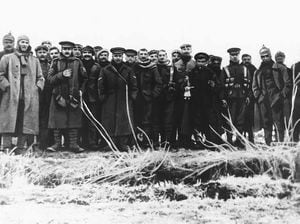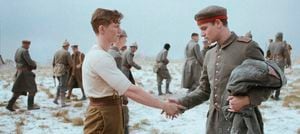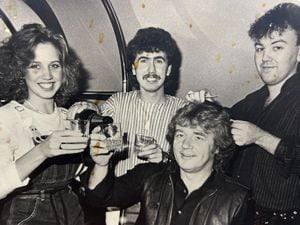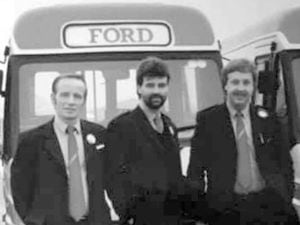How local soldiers played their part in the famous 1914 Christmas Day truce
We'll play football today, and we can get back to killing each other later...

The Christmas Day truce of the Great War in 1914, when in some parts of the line the guns fell silent and British and German soldiers climbed out of the trenches to chat, share cigarettes, and have a kickabout in No Man's Land, is famous as a moment of humanity amid the horror.
Local historians Richard Pursehouse and Ben Cunliffe have researched the part soldiers from the North Staffordshire Regiment and South Staffordshire Regiment – which will have included many from the West Midlands – played in that brief oasis of peace on the Western Front.
"Staffordshire newspapers shortly after Christmas 1914 ran stories, both general and specific," says Richard.
One reported: "An attempt was made to tamper with two battalions during an informal suspension of arms to bury the dead of both armies. Both parties sang carols, and at several points Auld Lang Syne was sung. The Huns, however, spoiled the tone of the proceedings by exultingly declaring that they would win the war and take their next Christmas dinner in London and Paris."
The Staffordshire Advertiser dated February 27, 1915, ran a story under the headline ‘Played the Germans at football.’
It included an interview with Drummer Arthur E Salt, of the 1st North Staffordshire Regiment, who was newly back home at Railway Cottages, Great Bridgeford, near Stafford, having suffered frostbite and gastritis.
It quoted him as saying: "There were so many dead Germans in front of our trenches and also in them that we gave the Germans a twenty-four hours’ armistice on Christmas Day to bury their dead. Of course, during the day we paid compliments, and had a sing-song.
"They said they would sooner be in London or anywhere except where they were. Well, we had a football contest, and England won 2-1. We parted on best of terms, and at night started on our usual game, as butchers, of killing one another.”

Richard says the same newspaper dated December 31, 1914, had run a story from a different part of the front about an Aston Villa player, Gunner Herbert Smart serving in the 5th Battery Royal Field Artillery, who had written home about the "interchange of courtesies" between British and Germans on Christmas Day.
“The Germans had a Christmas tree in the trenches and Chinese lanterns along the top of a parapet," Gunner Smart had written.
"'Come over' said one German soldier, 'I want to speak to you.' We didn’t know how to take it at first, but one of the nuts went over, and as no harm befell him others followed. But our commanding officer would not let more than three at a time go. I went out myself on Christmas Day and exchanged some cigarettes for cigars. The German I met had been a waiter in London, and could use our language a little. He says they do not want to fight.”
An unnamed officer in the South Staffords, writing home to his wife in Penn, Wolverhampton, told how on Boxing Day he and a fellow officer walked down to the trenches the regiment were about to occupy.
He added: “The (here the name of the unit was censored) who were occupying them said it was very funny yesterday (Christmas Day). The Germans showed themselves over the top of their trenches, which are only fifty yards off, and held their hands up, and then got up on top of the trench and sent men out halfway towards our lines.
“After this a few of us thought it would be just as well to shake hands and exchange cigarettes, etc., with them; we called them, and met a few half-way between the trenches; they put down cigars on the ground and they were jolly good sports, too. One fellow found a top hat and frock coat, and he was dancing about in it.
“On Christmas Day we had a football out in front of the trenches, and asked the Germans to send a team to play us, but either they considered the ground too hard, as it had been freezing all night, and was a ploughed field, or else their officers put the bar up.
“One of our side went out, and they shook his hand and said, ‘Let us have a day off as it is Christmas, and we won’t do any shooting,’ and told our people they could go out and bury their dead and they wouldn’t shoot.”
Many of those who took part in, or witnessed, the truce, were destined to join the dead.
In a last letter completed just two days before he was shot dead, King’s Shropshire Light Infantry officer Captain Robert Patrick Miles, who was 35 and attached to the Royal Irish Rifles, described the events.
“Friday (Christmas Day). We are having the most extraordinary Christmas Day imaginable. A sort of unarranged and quite unauthorised but perfectly understood and scrupulously observed truce exists between us and our friends in front. The funny thing is it only seems to exist in this part of the battle line – on our right and left we can hear them all firing away as cheerfully as ever."
He wrote that he was disappointed to see that the Germans were a "cheery lot of fellows".
"I had hoped to see a collection of living skeletons half-covered with rags, animated toast-racks in uniforms. They are distinctly bored with the war and do not seem to have been impressed by the famous ‘Hymn of Hate’ that we read with so much glee in The Daily Mail. In fact one of them wanted to know what on earth we were doing here fighting them.”
In Captain Miles' sector the truce continued on Boxing Day. “The beggars simply disregard all our warnings to get down from off their parapet, so things are at a deadlock. We can’t shoot them in cold blood. Short of murdering a few – and it would be regular murder – I cannot see how we can get them to return to business.”
When three British artillery shells landed on the German trench: “I’m dashed if a couple of them didn’t come over and complain about it, didn’t seem to think it was playing the game at all.”
The letter ended on December 28, 1914. Captain Miles was shot dead while he stood giving orders in the trenches on December 30.
Richard says depending on the positions of the trenches some of the truces continued for several days and even weeks.
"Many generals on both sides in the main thought it was madness to fraternise on Christmas Day and beyond. The men – and officers – who shared cigars, cigarettes, chocolate, bread, schnapps or strong navy rum also exchanged addresses and regimental buttons from their coats and tunics. They sang Silent Night across no man's land to each other, to the same tune but in their own languages.
"They reflected on where the true madness lay – behind the lines in the generals’ chateaux."





